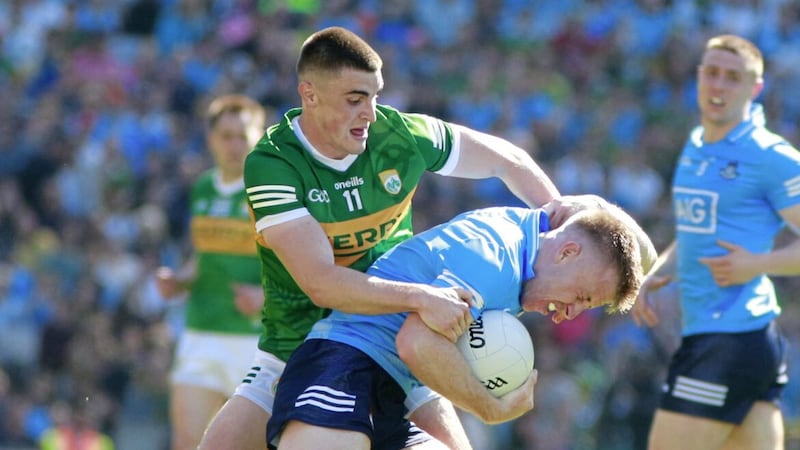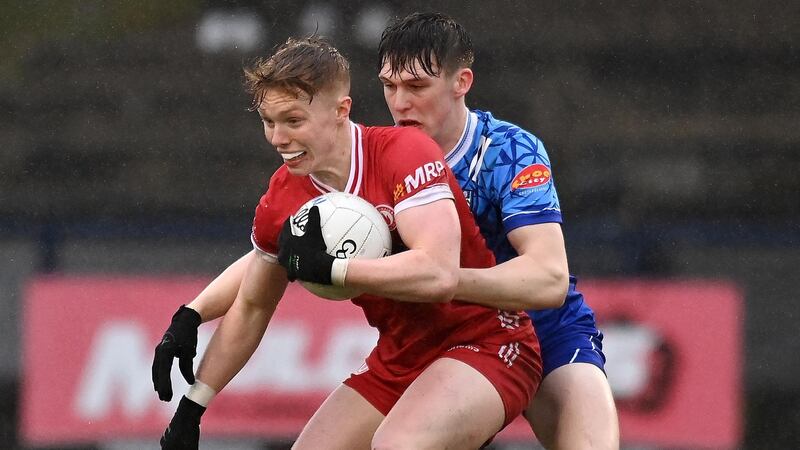THE vast majority of managerial post-match interviews aren’t worth the paper they end up printed on.
Maybe it’s wrong to say that given the industry we’re in, but it’s the truth.
There is one particularly notable exception: Kieran McGeeney.
The great joy in interviewing the Armagh manager is that he’s seldom interviewed. On the days that his team wins, he’ll send out a member of the backroom team to talk.
Rarely ever does podcasts, not interested in a sit-down one-to-one, he walks with a mistrust and at times disdain for the media.
Whenever he does present himself, he is engaging, argumentative, opinionated, occasionally withering, and with a deadpan humour.
And he loves to disagree with journalists. If you hinted the sky was blue, he’d say it was grey for fear of agreeing with a member of the fourth estate.
Yet if you go right back to the start of his managerial career, he has been utterly, completely consistent on one topic: the tackle.
When he was Kildare manager in 2010, McGeeney spoke as an ambassador at a Cul Camp and got drawn into the debate. His team had just drawn with Westmeath and he admitted that he didn’t know what to coach any more when it comes to players tackling.
“The rule in Gaelic football is that you are allowed to tackle with an open hand or shoulder to shoulder but a shoulder is three different parts. The thing is if you knock someone over it is a free. If you don’t, it isn’t,” he said.
“You couldn’t have the likes of Darragh Ó Sé hitting the likes of Jason Sherlock. It just isn’t allowed. Even though it is within the rules. It just looks unsafe. That is like asking Paul O’Connell not to tackle Ronan O’Gara. It doesn’t make any sort of sense but that is just what we have.
“We’ve changed the rules a lot of times since I’ve been playing and coaching, and they still haven’t changed the tackle.
“There’s no clear definition of it. One week if you’re strong it’s an advantage, the next week it’s a disadvantage. It varies on the referee and the type of game that’s being played…
“Just to make it more clear-cut, easier for the referees, because if you’ve on the one hand players bluffing it, and then the ambiguity of the rules on the other hand, it’s a hard thing to make a call on.
“If you look at the rules of Gaelic football, if you played them stringently then nearly everything you do in Gaelic football would probably fall over.
“But where you look at hurling where they’re not practised as watertight and the game flows a wee bit more. That leads you to two avenues – do you lighten up on the refereeing, or do you change the rules?
“It’s a difficult way to do it, but you can’t continue to have a game of half-rules because it’s unfair on the referees who are trying to make a call on something,” said McGeeney.
In the twelve years since, there are copious examples of the Armagh boss reiterating his point.
He is absolutely, 100 per cent correct.
There is a vicious cycle when it comes to refereeing.
Standards appear to be dipping, particularly at club level.
The men actually doing the refereeing are not to be blamed for this.
The problems are so deep-rooted that they can only be fixed by a complete overhaul of the rules around the tackle.
We need to gather a committee of the right people – current players and coaches – in a room and go through visual demonstrations of various types of tackle, and then decide if they should be fouls or not.
If refereeing standards are poor, it’s no wonder.
They’re being recruited far too late to do a job nobody wants with less help than ever. The money would barely cover your diesel in these times, never mind pay you. The culture is to abuse, verbally and physically, and to question.
Assaults on officials are nothing new.
It was after a game in Dungannon in the early 1970s that Foreglen whistler Tom McFeely was met by a Tyrone spectator coming off the pitch and his jaw broken.
The same happened to young Donegal referee Donal Gallagher in the same year McGeeney made the comments above, 2010.
There was the famous assault on Wicklow referee Johnny Price, who ended up locked in the boot of his car after a club U21 final in 1985.
The most incident in Roscommon left a referee floored, a guilty-looking mentor walking away and the official’s colleagues walking out on the weekend’s fixtures.
Referees should have gone on strike a long time ago. You can’t attack referees and the punishments must be severe.
But players feel very frustrated too. They’re having frees given against them for something that wasn’t a foul two minutes earlier, or the week previous.
Players don’t know what a foul is any more than referees do.
The quality of decision-making is skewed because refereeing isn’t always attracting the right people either.
They’re not young enough, not fit enough and not often didn’t play enough football themselves to meet the unattainably high standards of the stone-overweight-and-couldn’t-kick-snow-off-a-rope corner-back they’re giving a free against.
It’s all well and good to have designs on complete silence and nobody speaking to the referee only the captain, but if you implemented that in the morning it would cause war because the root cause of the problem isn’t being tackled first.
Continually, the GAA resists the urge to define what is a foul and what isn’t.
Allowing for physicality in a sport where you’re trying to dislodge the ball from a man’s arms is imperative, but telling players and referees definitively what contact is allowed and what contact isn’t is the only way we’ll solve any of this.
Because as it stands, the only way to be a half-decent Gaelic football referee is to ignore the rules – but only if you know the game well enough to implement a decent set of your own.








